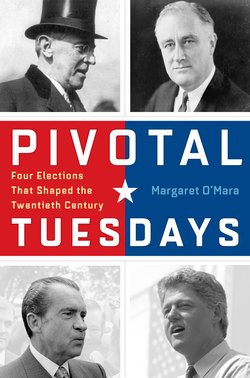Читать книгу Pivotal Tuesdays - Margaret O'Mara - Страница 7
На сайте Литреса книга снята с продажи.
ОглавлениеAUTHOR’S NOTE
A presidential election changed my life. On 9 July 1992, I stood on the lawn of the Arkansas Governor’s Mansion on a stickily hot Southern summer day. Along with the crowd packed tightly around me, I was waiting to see Bill Clinton emerge from inside with his newly announced running mate, Tennessee Senator Al Gore.
I’d graduated from college earlier that summer without having secured a job, and so returned reluctantly to my hometown of Little Rock to live at home, save some money, and wait until rosier opportunities emerged in seemingly more glamorous and distant cities. Yet within a week of arriving, I had discovered that something very exciting was happening in my sleepy little town: our governor was about to become the Democratic presidential nominee, and his campaign headquarters was a mere mile from my house. I knew Bill Clinton—everyone in this small Southern state knew Bill Clinton—but working for his campaign had never really occurred to me.
Until 9 July. Three days before that, I had rather timidly trekked downtown to Clinton campaign headquarters and offered my services as a part-time volunteer. Immediately, I found myself in the center of a whirl of activity and excitement. Young people from Washington, New York, and Chicago scurried around the building, working from early in the day to late at night. My first day in this hive of activity was spent standing at a copy machine, churning through contribution slips from small donors, watching the currents of campaign energy stream around me. I came back for a second day, and a third. This was turning out to be rather exciting. Then the announcement of the vice presidential nominee prompted all of us, even the lowliest of copy room volunteers, to make the trip to the Governor’s Mansion to see Gore introduced in person.
Standing on the lawn, the July sun beating down on my head, we watched the Clintons and Gores and their children wave to the crowd and the television cameras crowd all around us. My post-graduation funk started to evaporate. This is a cause worth joining, I thought. This is thrilling, and bigger, and important. When offered an official campaign job the next day—moving up from the copy room to the mailroom—I didn’t hesitate.
Twenty years later, after five years as a staff person in the White House and elsewhere in the executive branch, five in graduate school, and ten as a teacher and writer of American history, I was asked to give a series of public talks about presidential elections, 1992 included. In putting together these lectures, I discovered things I had forgotten about the history I had lived through, and realized how elections through modern history connect to and feed back on one another.
My time on the campaign trail and in Washington had spurred me to become a scholar of American politics and policy. With this project, things have come full circle.
As I witnessed the scene on the lawn of the Governor’s Mansion that July day, I had little understanding of the broader forces that propelled its possibility and its ultimate trajectory. This was a political moment made possible by cultural and political changes that had been decades in the making: economic and geographic realignments, the rise of a new generation of Democratic centrists and Reagan Revolutionaries, the restructuring of the media and the rise of cable television, the ascendance of professional political consultants. It built on the experiences and triumphs and failures of the 50 elections that had come before it. It was a reflection of history, and history in the making. There are many of these moments, in every campaign. They are pivotal to the election at hand, yet possible because of broader historical shifts.
The purpose of this book is to make these connections.
